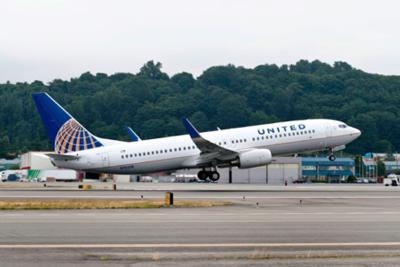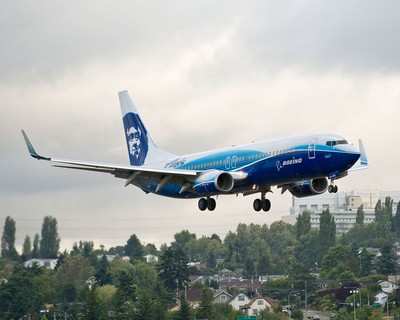Alaska Airlines To Begin Extensive Use Of Renewable Fuel
Wednesday
The first U.S. commercial flight powered by advanced biofuels
was flown Monday by Contenental Airlines, according to parent
company United Continental Holdings. Flight 1403, a Boeing 737-800,
departed Houston's Bush Intercontinental Airport at 1030 CST for
Chicago O'Hare International Airport, making United the first U.S.
airline to fly passengers using a blend of sustainable, advanced
biofuel and traditional petroleum-derived jet fuel.
File Image

"United is taking a significant step forward to advance the use
of environmentally responsible and cost-efficient alternative
fuels," said Pete McDonald, United's executive vice president and
chief operations officer. "Sustainable biofuels, produced on a
large scale at an economically viable price, can one day play a
meaningful role in powering everyone's trip on an airline."
Monday's flight demonstrates United's commitment to sustainable
biofuels and making progress toward enhancing energy security,
diversity of our fuel supply and a reduction in lifecycle
greenhouse gas emissions compared to traditional fossil fuels.
"(R)oughly four months since the approval of hydroprocessed
renewable fuels in commercial aviation, we are excited to see the
deployment of these fuels on a domestic U.S. flight," said Air
Transport Association of America (ATA) Vice President and Chief
Economist John Heimlich. "ATA member airlines continue to
demonstrate leadership in fostering new and environmentally
preferred sources of energy to transport people and goods
throughout the globe."
Solazyme, working with Honeywell's UOP process technology,
developed the algae oil that was refined into jet fuel to power
today's commercial flight. Solazyme produced the world's first 100
percent algae-derived jet fuel for both commercial and military
applications.
Also Monday, United is announcing it has signed a letter of
intent with Solazyme to negotiate the purchase of 20 million
gallons of jet fuel per year, derived exclusively from algae oil,
for delivery as early as 2014. Solazyme, headquartered in south San
Francisco, manufactured the algae oil used on today's flight
through its proprietary fermentation process. The end product was
then refined outside Houston using renewable jet fuel processing
technology from Honeywell's UOP.
Meanwhile, Alaska Airlines will fly 75 commercial passenger
flights in the United States powered by biofuel, starting this
Wednesday. Two maiden biofuel-powered flights will leave Seattle on
Nov. 9 for Washington, D.C., and Portland, OR. Alaska Airlines and
its sister carrier, Horizon Air, will continue to operate select
flights between Seattle and the two cities over the next few weeks
using a 20 percent blend of sustainable biofuel made from used
cooking oil that meets rigorous international safety and
sustainability standards.

"This is a historic week for U.S. aviation. The 75 flights that
Alaska Airlines and Horizon Air will fly over the next few weeks
reflect our longstanding commitment to environmental responsibility
and our belief that sustainable biofuels are key to aviation's
future," Alaska Air Group Chairman and CEO Bill Ayer said.
"Commercial airplanes are equipped and ready for biofuels. They
will enable us to fly cleaner, foster job growth in a new industry,
and can insulate airlines from the volatile price swings of
conventional fuel to help make air travel more economical. What we
need is an adequate, affordable and sustainable supply. To the
biofuels industry, we say: If you build it, we will buy it."
Alaska Air Group estimates the 20 percent certified biofuel
blend it is using for the 75 flights will reduce greenhouse gas
emissions by an estimated 10 percent, or 134 metric tons, the
equivalent of taking 26 cars off the road for a year. If the
company powered all of its flights with a 20 percent biofuel blend
for one year, the annual emissions savings would represent the
equivalent of taking nearly 64,000 cars off the road or providing
electricity to 28,000 homes.
 ANN's Daily Aero-Term (04.20.24): Light Gun
ANN's Daily Aero-Term (04.20.24): Light Gun Aero-News: Quote of the Day (04.20.24)
Aero-News: Quote of the Day (04.20.24) ANN's Daily Aero-Linx (04.21.24)
ANN's Daily Aero-Linx (04.21.24) Aero-News: Quote of the Day (04.21.24)
Aero-News: Quote of the Day (04.21.24) ANN's Daily Aero-Term (04.21.24): Aircraft Conflict
ANN's Daily Aero-Term (04.21.24): Aircraft Conflict




